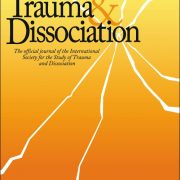Abuse, Trauma, Healing & Recovery
On The Web
Alice Miller – www.alice-miller.com
Website of pioneering psychotherapist Alice Miller
Recovered Memory project – http://blogs.brown.edu/recoveredmemory/about/
Case Archives, Commentary, and Scholarly Resources
David Baldwin’s Trauma Information Pages – www.trauma-pages.com
Providing information for clinicians and researchers in the traumatic-stress field
The European Society for Trauma and Dissociation – www.estd.org
Promoting an increase in the knowledge of Trauma, Dissociation and all disorders related to chronic traumatisation.
International Society for the Study of Trauma and Dissociation – www.isst-d.org
Seeking to advance clinical, scientific, and societal understanding about the prevalence and consequences of chronic trauma and dissociation
Jim Hopper’s Information Pages – www.jimhopper.com
Providing scholarly knowledge and resources, in language and formats accessible to any interested and motivated person – young or old, highly educated or not.
The Lantern Project – www.lanternproject.org.uk
Formerly known as “Victims No Longer”, the Lantern Project offers a website supporting victims of childhood sexual abuse, domestic violence, racial abuse and bullying.
Medical Foundation for the Care of Victims of Torture – www.torturecare.org.uk
A charity that is dedicated soley to the treatment of torture survivors, including: advocacy, counselling & physical therapies.
One in Four UK – www.oneinfour.org.uk
One in Four offers a voice to and support for people who have experienced sexual abuse and sexual violence.
Rape Crisis (England and Wales) – www.rapecrisis.org.uk
Provides co-ordination and support to affiliated member groups and campaigns and lobbies to raise awareness of the issues of sexual violence in the wider community and with local, regional and national government.
The Recovery Practice – http://www.therecoverypractice.org.uk/
The Recovery Practice aims to help make mental health and well being possible for all people and to contribute to the understanding of mental health problems. Julian Turner has had over twenty years counselling practice and has worked extensively with people who have experienced emotional distress. He works in the Leeds area.
Respond – www.respond.org.uk
Works with children and adults with learning disabilities who have experienced abuse or trauma, as well as those who have abused others, through psychotherapy, advocacy, campaigning and other support.
Sidran Traumatic Stress Institute – www.sidran.org
International not for profit organisation aimed at supporting people to recovery form the effects of trauma (including dissociative disorders).
Support Line – www.supportline.org.uk/problems/child_abuse_survivors.php
Provides guidance and resources for adult survivors of childhood abuse.
Trauma and Abuse Group – www.tag-uk.net
TAG promotes education and raises awareness in the field of dissociation, attachment, trauma and abuse recovery.
Trauma and Abuse Support Centre – www.tasc-online.org.uk
Provides a UK web-based resource for survivors of the whole spectrum of child sexual abuse (including extreme and ritual abuse) and for anyone involved in supporting them.
Women’s Aid – www.womensaid.org.uk
A national charity working to support women and children affected by domestic violence. Site includes finding help locally and a survivors handbook.
In Print
Bass, E. and Davis, L. (1988). The Courage to Heal: A Guide for Women Survivors of Child Sexual Abuse. Cedar Press.
Bloom, S. (1997). Creating Sanctuary: Towards the Evolution of Safe Communities. London: Routledge.
Blume, S. (1990). Secret Survivors: Uncovering Incest and its After-effects in Women. John Wiley and Sons.
Brison, S.J. (2002). Aftermath: Violence and the Remaking of a Self. Princeton University Press.
Davis, L. (1991). Allies in Healing: When the Person You Love Was Sexually Abused as a Child. HarperPerennial.
Davoine, F. and Gaudilliere, J-M. (2004). History Beyond Trauma. Other Press LLC.
Dolan, Y. (2000). Beyond Survival: Living Well is the Best Revenge. BT Press: London.
Fraser, S. My Father’s House: A Memoir of Incest and of Healing. Virago Press.
Herman, J. L. (1992). Trauma and Recovery. New York: Basic Books.
Levine, P. (1997). Waking the Tiger: Healing Trauma – The Innate Capacity to Transform Overwhelming Experiences. New York: North Atlantic Books.
Levine, P. (2008). Healing Trauma: A Pioneering Program for Restoring the Wisdom of Your Body. Boulder, CO: Sounds True Inc.
Mackinnon, M. (1991). Each Small Step: Breaking the Chains of Abuse and Addiction. Gynergy Books.
Maltz, W. (1992). The Sexual Healing Journey: A Guide for Survivors of Sexual Abuse. Qill: HarperCollins Publishers.
Perry, B. (2008). The Boy Who Was Raised as a Dog and Other Stories from a Child Psychiatrist’s Notebook: What Traumatized Children Can Teach us About Loss, Love and Healing. New York: Basic Books.
Rothschild, B. (2000). The Body Remembers: The psychophysiology of trauma and trauma treatment. London: W. W. Norton & Co.
Rothschild, B. (2010). 8 Keys to Safe Trauma Therapy: Take Charge Strategies to Empower Your Healing. W. W. Norton & Co.
Sebold, A. (2003). Lucky. Picador.
Spring, J. (1987). Cry Hard and Swim: The Story of An Incest Survivor. Virago Press.
Tal, K. (1996). Worlds of Hurt: Reading the Literatures of Trauma. Cambridge University Press.
Venable Raine, N. (2000). After Silence: Rape and My Journey Back. Virago Press Ltd; New edition.
Warner, S. (2000). Understanding Child Sexual Abuse: Making the Tactics Visible. Handsell Publishing.





